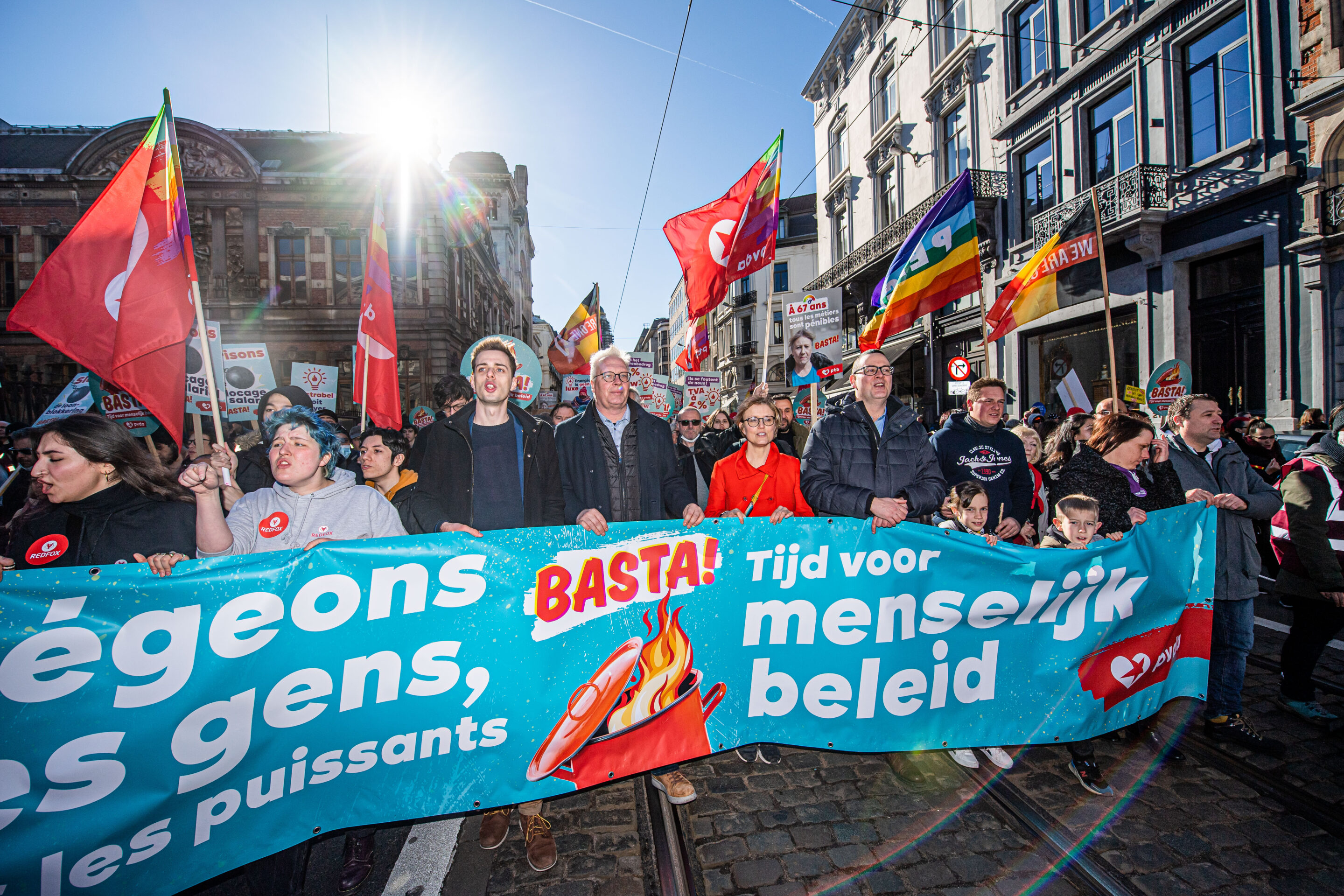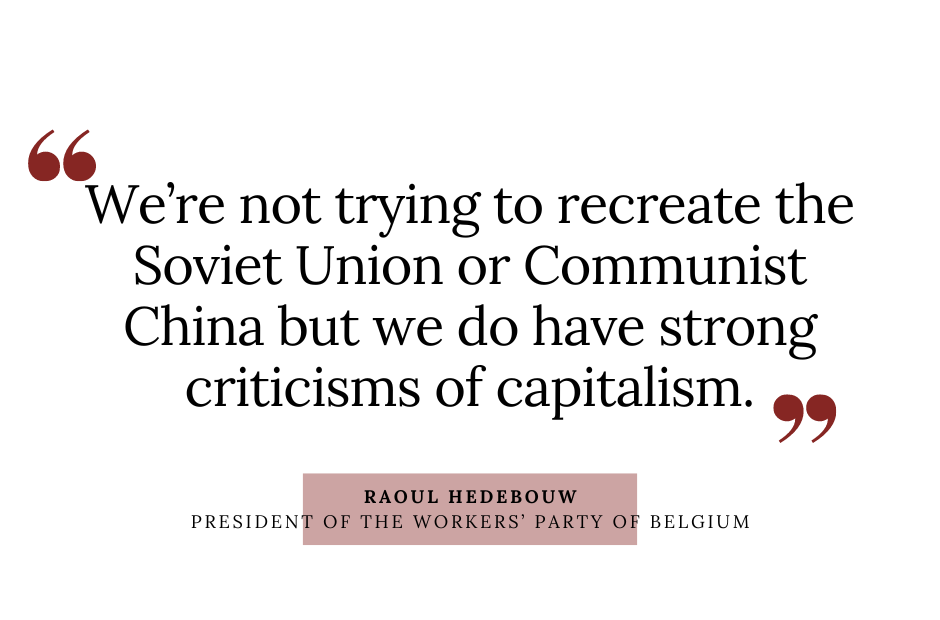As Belgians go to the polls at the end of this week, the country’s 12 main parties are jostling for the limelight, slating opponents and unleashing rhetoric to highlight how distinct they are from rivals.
It’s an unusual change from the normal negotiating between parties, with few willing to contemplate the inevitable concessions that will define the long negotiations that will occupy the weeks and months after Sunday’s election. With compromise a national imperative, we are used to seeing party colours diluted and their edges smoothed to fit into the jigsaw of government. Whilst this election campaign has provided an opportunity to accentuate political differences, the opposite will soon be true as now keen adversaries instead eye each other up as potential partners.
Except that this time around it seems that the centre cannot hold, as voters move towards the further ends of the political spectrum. As in other countries around the world, Belgium also is asking whether a lurch to the hard right will hammer nails in the coffins of centrist groups.
But if this is to be the election in which favour for the established ruling parties fades, one of the 12 contestants is pulling out all the stops to persuade the public that change doesn’t have to come from the right. Promising a “rupture from traditional politics”, the Workers’ Party of Belgium is rising in opinion polls and has successfully steered the national conversation on key policies.
As a staunch opponent of De Croo’s “Vivaldi” government, the party has been unconstrained in its condemnation of most federal decisions. But if it realises the gains it is predicted, how would the Workers’ Party shape national affairs?
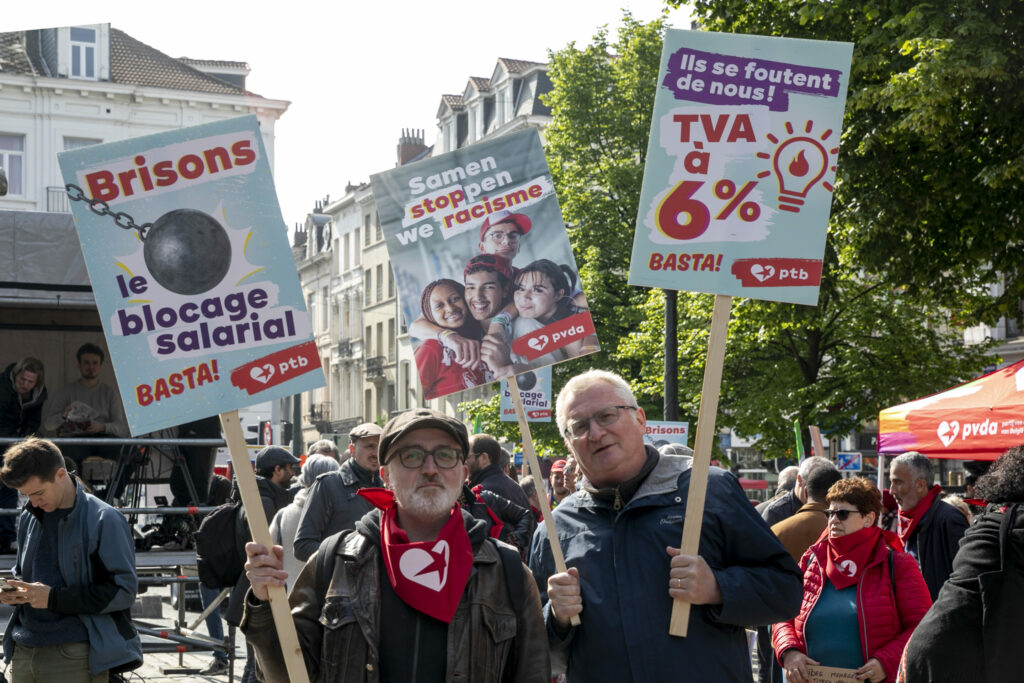
PTB/PVDA activists in Brussels on Labour Day, Sunday 01 May 2022. Credit: Belga
Perhaps fittingly, the PTB/PVDA (Parti du Travail de Belgique in French; Partij van de Arbeid van België in Dutch) is Belgium’s only national party, operating in all the regions whereas the other groups are split between language communities. The party’s perfectly bilingual president Raoul Hedebouw is a face that can now be seen smiling from campaign posters in all corners of the country.
Meeting in the party’s Brussels HQ in the multicultural Anneessens neighbourhood, the 46-year-old Liège native is no less affable than in pictures, more personable than imposing and unwaveringly upbeat. The wrath he sometimes conjures up is saved for Chamber debates and picket lines.
Shortly after we meet, Hedebouw will enter the party’s media studio to address supporters on a live stream that will be broadcast on social media. It’s a notably young team that bustles through the corridors and the party has been active on all channels of communication, mindful of the power of social networks for generating a buzz. With public visibility key to electoral success, PTB/PVDA has turned to innovative technologies to get its lead candidate out there.
In cities around Flanders – where the party is historically less popular but is focussing efforts – it ran a “hologram tour” with screens so that passers-by could speak directly to Hedebouw (who was back in the studio). A similar concept was used to great effect in the campaign of India’s populist premier Narendra Modi.
Fighting spirit
Rival parties have needled the PTB/PVDA for its heavy use of social media. They question how a party that is so scathing about tech giants and calls for much tighter taxes on multinationals can simultaneously spend tens of thousands on social media campaigns. For Hedebouw it’s a duplicitous line of attack that puts ideals above the reality: by far the biggest spenders on this front are the Flemish far right, with both Vlaams Belang and N-VA putting over €1.5 million towards Facebook ads in 2023; PTB/PVDA spent just over €800,000. “We’re not going to abandon the fight and leave the door wide open to the far-right,” Hedebouw reasons. “Other francophone parties might not care what happens in Flanders but we refuse to stand down.”
It doesn’t take much provocation to get Hedebouw on the attack, more combative than compromising. An ardent advocate of equitable wealth distribution – “Belgium is a tax hell for workers and a tax haven for the ultra-rich!” – he is quick to highlight systemic failures that should be torn up rather than adjusted.
His often fierce condemnation of the current government – made up of seven parties – pits the PTB/PVDA against much of Belgium’s political establishment. And whilst the group is proud to define as “A party unlike the others”, this can see them likened to far-right antagonists Vlaams Belang – ideologically the diametric opposite of the PTB/PVDA.
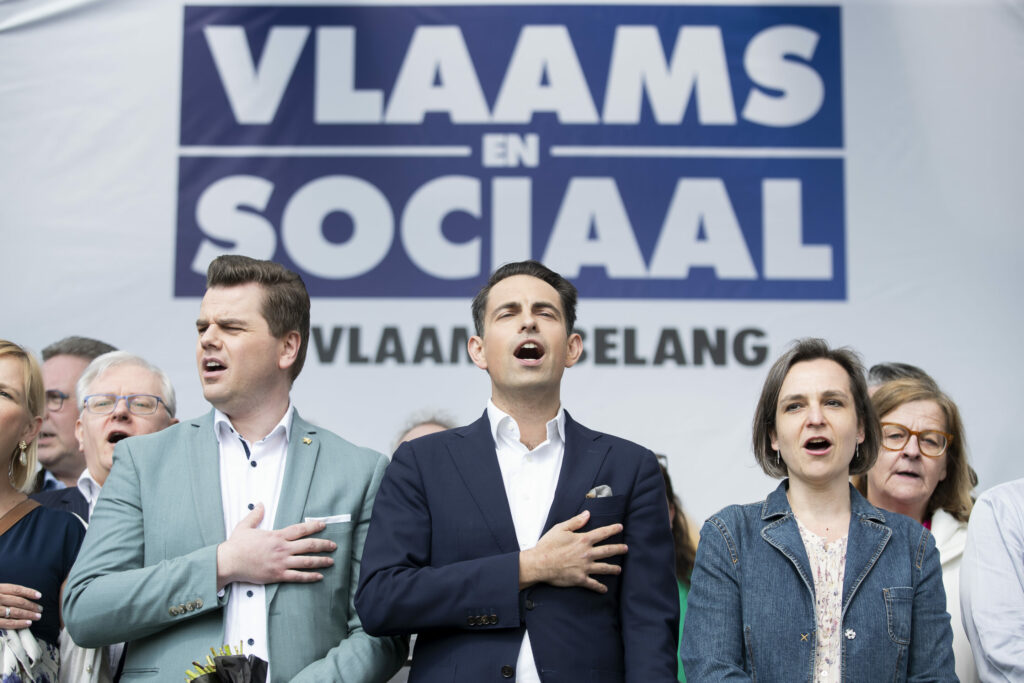
Despite Hedebouw's remonstrations, similarities have been remarked between the PTB/PVDA and far-right Flemish separatists Vlaams Belang. Credit: Belga
Hedebouw speaks of a “false parallelism” with the Flemish nationalists, insisting there is “no equivalence” between the parties. Whilst more centrist challengers have smeared the PTB/PVDA as populist, their leader is adamant: “I’m not a populist, I’m a Marxist.” In a crowded political landscape, nuance is important and Hedebouw is particular about labels pinned to his party. He rejects the term “extreme left”, which he says casts them in the same bracket as Vlaams Belang. “We stand for intellectual pursuit and equality. Moreover, we support a united Belgium (Vlaams Belang are fervent Flemish separatists ed. not).”
But whilst the far right and far left parties are in reality wildly different – after all, Vlaams Belang is actively excluded from political partnerships through the cordon sanitaire – on some issues they do seem to be fishing from the same pool of voters. The PTB/PVDA has railed against “punitive ecology”, a recurring catchphrase wielded by right-wing anti-environmental movements.
Whilst Hedebouw’s party recognises the climate priorities and sees this as a salient issue among voters, it disputes the current approach to decarbonising, calling measures such as a kilometre tax (designed to encourage people to use public transport rather than driving) “antisocial”. It warns that a similar approach sparked the major gilet jaune protests across France.
Social justice and the war on wealth
Though Hedebouw rejects any likening to the far right, the PTB/PVDA’s channels of communication, its tone of address, and enthusiasm for radical change nonetheless stirs up an energy comparable to firebrands on the other extreme. Hedebouw concedes that his party’s tactics are often inflexible but asserts the right “to speak with the passion of the working class”.
Emphasising his party’s commitment to facts rather than fake news, I remind him of the Colruyt saga, in which he lambasted the major Belgian supermarket for paying just 0.27% tax. He was forced to row back on the claim when fact-checkers showed that the actual tax rate is 25%. “Colruyt was the only mistake we made!” Hedebouw insists defensively.
The party makes no bones about its intention to go after corporations and the rich to fund its social spending. This would be three-pronged approach: taxing corporate profits; taxing capital gains from stocks and shares; and a “wealth tax”, which the party suggests would apply to individual fortunes of €5 million and over.
This latter point has gained particular traction in Belgium, with even the right-wing N-VA backing such a tax and opinion polls showing that 70-80% of Belgians would be in favour. As an example of how the debate can be influenced from the outside, Hedebouw is thrilled that other parties are proposing similar measures. “There’s no copyright on our policies but there is copy-left!” he quips.
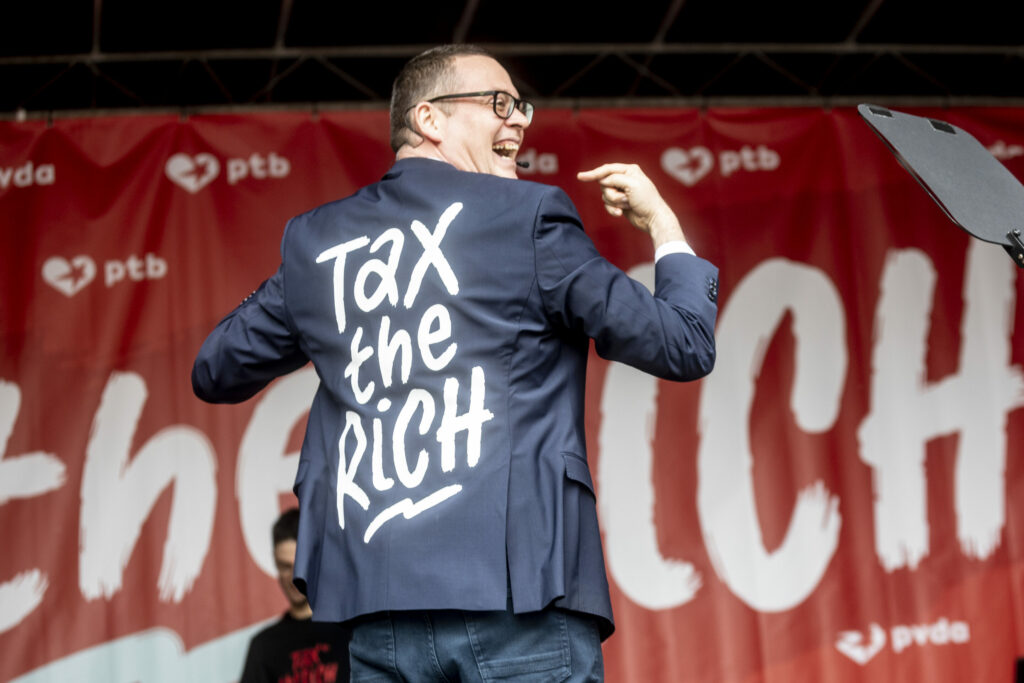
Hedebouw in Brussels on Labour Day, Monday 01 May 2023. Credit: Belga
The ideology clash
However, a wealth tax has become an unlikely point of contention between the PTB/PVDA and their closest ideological rivals, the Socialist Party (PS), which proposes one for fortunes of €1 million. Hedebouw explains that his party’s higher figure represents the richest 1% of Belgians and draws on the Occupy Wall Street slogan: “We are the 99%”.
The PTB/PVDA would have no issue lowering the threshold but Hedebouw uses the issue to illustrate his frustration with other parties on the left. He speaks of a “betrayal” of founding principles and recounts an especially bitter moment when the PS rejected a proposal to allow unions negotiate pay rises – a measure put forward by the PTB/PVDA in response to record profits of $21 billion in 2023 for Total Fina Antwerp.
This and other episodes have fed the narrative that the PTB/PVDA is the only party that really takes seriously la lutte des classes. It is open about its debt to Karl Marx and Hedebouw cites Antonio Gramsci’s theory of cultural hegemony (by which the ideas of the ruling class become the norm despite not benefitting the working class). The party is happy to get behind labour movements across Europe and frequently maligns neoliberal ideology. “Comrades” include Podemos in Spain, La France Insoumise, and Jeremy Corbyn.
“We’re not trying to recreate the Soviet Union or Communist China but we do have strong criticisms of capitalism for its failure to guarantee social security and protect the environment,” Hebedouw explains. As with similar labour movements, he would like public infrastructure and utilities to be State-managed for the benefit of society: “It seems obvious to us that not all sectors should be in the market economy.”
But delivering on its promises to the working class would require a tectonic shift in economic practice, not just in Belgium but at the EU level. Hedebouw is clear that his party is not pushing to leave the bloc (unlike hard left movements elsewhere). However it does dispute the “stranglehold” of EU competition laws and constraints such as the Maastricht Treaty, which dictates that national deficit must not exceed 3% of GDP. Belgium’s hit 4.4% last year.
Fearful of austerity measures that will likely be imposed to conform to the treaty, Hedebouw believes a commitment to ignore it should form the basis of a left-wing coalition. But political will for this outside the PTB/PVDA is lacking.
Keeping the economy in safe hands
Despite the rejection of neoliberal logic and a desire to redefine the social contract to improve working conditions and living standards for the poorer strata of society, the PTB/PVDA has been ranked highly for how its programme would impact Belgium’s economy. In a major number-crunching exercise carried out by Belgium’s Federal Planning Bureau (the agency that produces economic studies and forecasts), the policies of each of the 12 parties were analysed and their overall effect on the economy assessed.
Far from revealing a litany of unbudgeted campaign promises that would bring Belgium to the brink of fiscal ruin, the PTB/PVDA’s policies would in fact bring down the budget deficit and public debt. The results are a huge feather in the cap for the Worker’s Party and simultaneously blew a hole in the claims of economically conservative parties that paint themselves as responsible and restrained.
Though the PS also scored strongly in the final assessment, the study – published just one month before polling day – made for important campaign ammunition. Hedebouw believes his party could do even more for economic prosperity and argued that the FPB’s methods, based on conventional macroeconomic models which the PTB/PVDA rejects, didn’t encompass the full breadth of reforms the party would implement.
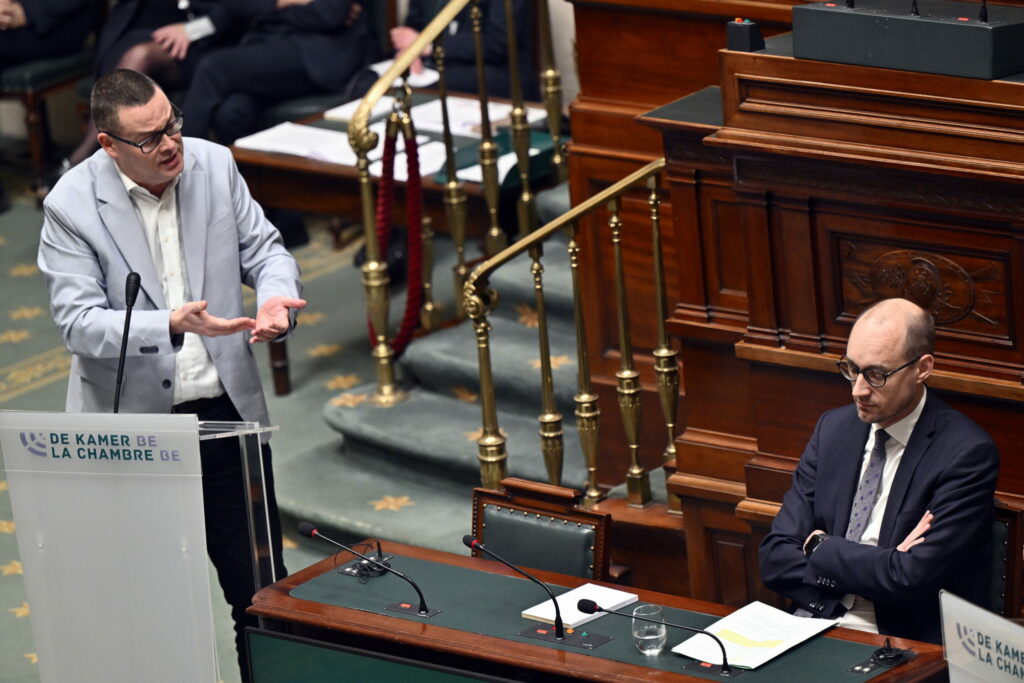
Uncompromising? Hedebouw attacks Finance Minister Vincent Van Peteghem (CD&V) during a plenary session, February 2024. Credit: Belga
Asked how this would affect residents of Belgium’s capital, Hedebouw outlines the wealth disparity that can be found in the city: “Brussels is a case study of the inequality that capitalism breeds.” He argues that the situation is getting worse as public works are carried out by large construction consortiums, who run up exorbitant costs and fail to deliver affordable housing, instead seeking profits.
The PTB/PVDA sees Brussels as structurally underfunded, saying that the capital generates 18-20% of the national economy but receives only 8.5% of the national budget. This amounts to an annual deficit of €1–€1.5 billion/year and Hedebouw explains is because revenue is taxed at the household rather than the workplace – an issue the PTB/PVDA is eager to address.
Related News
- Global ambitions and local results: The Mayor's mission to make Brussels a 'smart city'
- Bouchez-Hedebouw debate: PTB and MR disagree on everything, except tax reform
- Interview with Finance Minister Vincent Van Peteghem, the man balancing Belgium’s books
As our conversation comes to an end, I recall a recent debate that saw Hedebouw lock horns with his staunchest rival, Georges-Louis Bouchez (leader of the conservative-liberal Mouvement Réformateur). Sparks flew as it seemed that the societal views of the two were irreconcilable. Could Hedebouw suspend his convictions to understand where Bouchez is coming from? “He has a very elitist view of society that celebrates individual success rather than attributing it to a strong society.” Was the curt appraisal.
Bouchez has cited Margaret Thatcher as an inspiration and Hedebouw emphasised his opponent’s survival-of-the-fittest attitude. “He is very pleased with himself and takes home €18,000/month; I have €2,300 net! It’s important to understand the mindset of opponents and I think this is largely a question of how we view class; I aim to serve the working class whilst he serves the rich.”
But whether Belgium shares Hedebouw’s radically different vision for society remains an open question.

